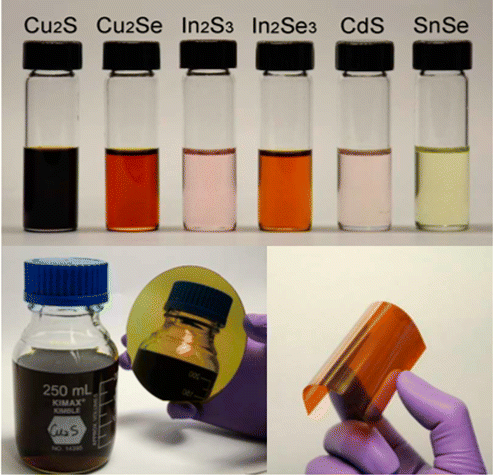Publications
Cosolvent Approach for Solution-Processable Electronic Thin Films
Z. Lin, Q. He, A. Yin, Y. Xu, C. Wang, M. Ding, H.-C. Cheng, B. Papandrea, Y. Huang, and X. Duan
ACS Nano 9, 4398–4405 (2015)

Low-temperature solution-processable electronic materials are of considerable interest for large-area, low-cost electronics, thermoelectrics, and photovoltaics. Using a soluble precursor and suitable solvent to formulate a semiconductor ink is essential for large-area fabrication of semiconductor thin films. To date, it has been shown that hydrazine can be used as a versatile solvent to process a wide range of inorganic semiconductors. However, hydrazine is highly toxic and not suitable for large-scale manufacturing. Here we report a binary mixed solvent of amine and thiol for effective dispersion and dissolution of a large number of inorganic semiconductors including Cu2S, Cu2Se, In2S3, In2Se3, CdS, SnSe, and others. The mixed solvent is significantly less toxic and safer than hydrazine, while at the same time offering the comparable capability of formulating diverse semiconductor ink with a concentration as high as >200 mg/mL. We further show that such ink material can be readily processed into high-performance semiconducting thin films (Cu2S and Cu2Se) with the highest room-temperature conductivity among solution-based materials. Furthermore, we show that complex semiconductor alloys with tunable band gaps, such as CuIn(SxSe1–x)2 (0 ≤ x ≤ 1), can also be readily prepared by simply mixing Cu2S, Cu2Se, In2S3, and In2Se3 ink solutions in a proper ratio. Our study outlines a general strategy for the formulation of inorganic semiconductor ink for low-temperature processing of large-area electronic thin films on diverse substrates and can greatly impact diverse areas including flexible electronics, thermoelectrics, and photovoltaics.
UCLA, Department of Chemistry and Biochemistry
607 Charles E. Young Drive East, Box 951569
Los Angeles, CA 90095-1569
E-mail: xduan@chem.ucla.edu
607 Charles E. Young Drive East, Box 951569
Los Angeles, CA 90095-1569
E-mail: xduan@chem.ucla.edu







